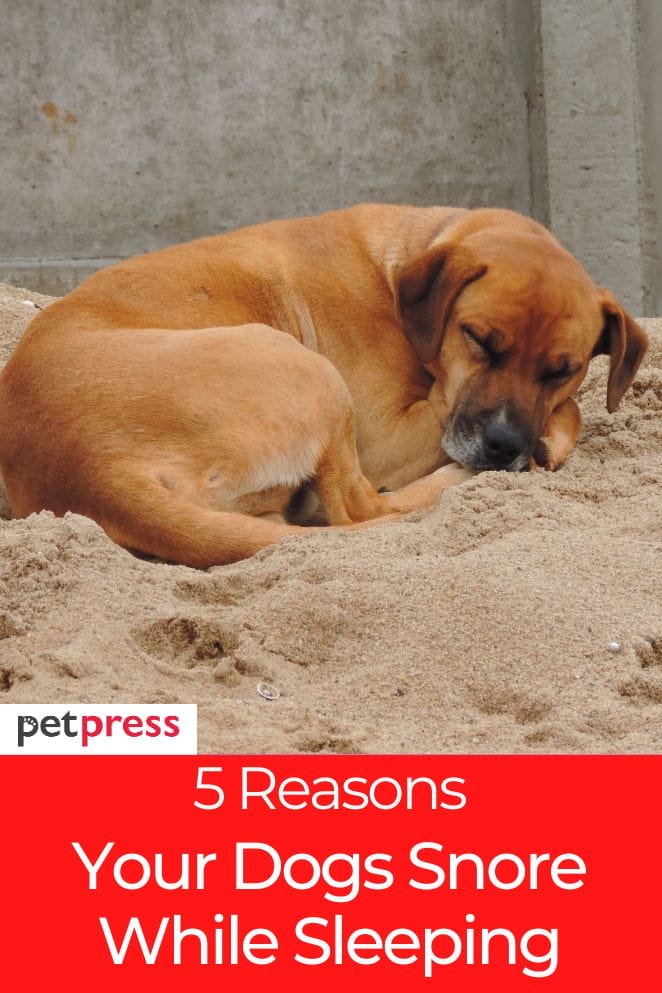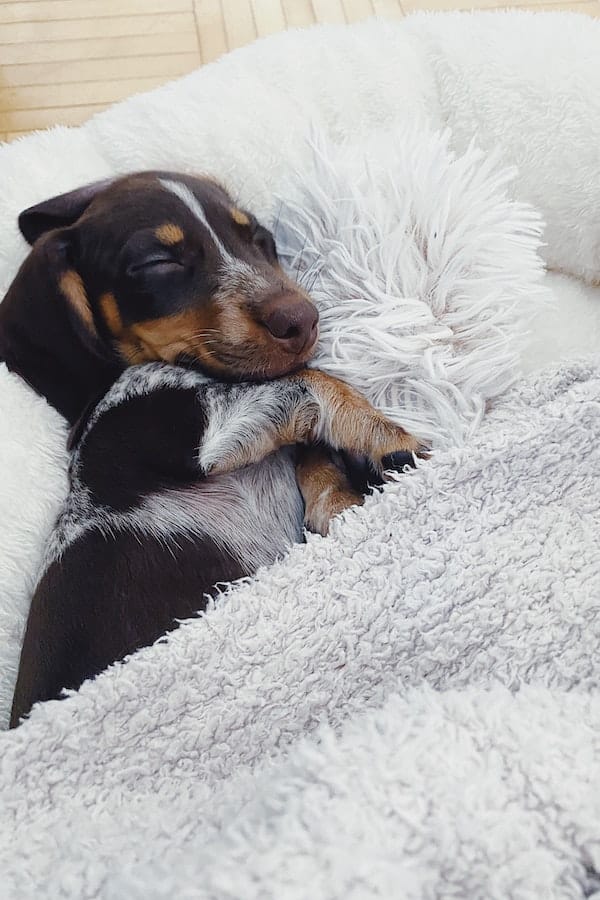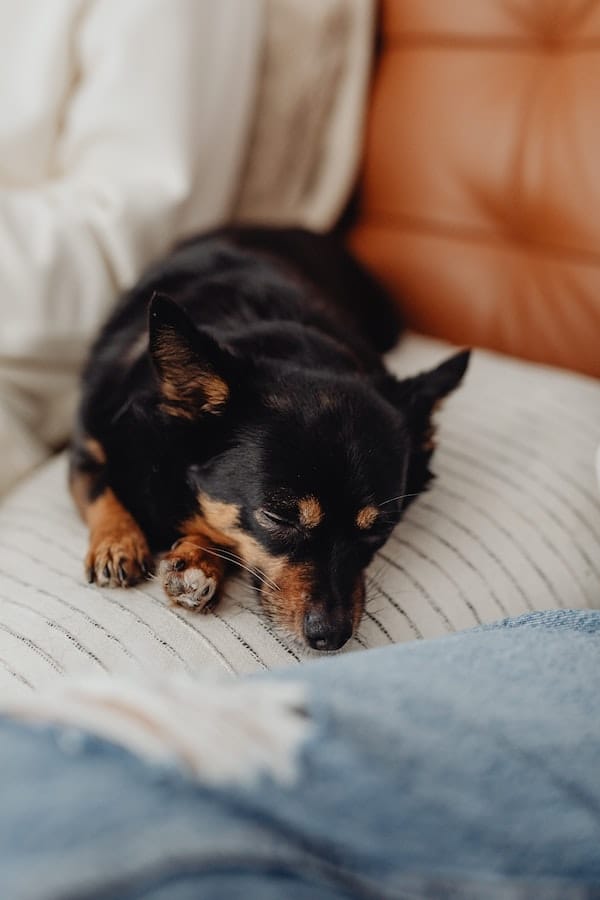
Snoring is a common problem for humans, but you may be surprised to learn that it also affects our canine companions.
Dogs snore for the same reasons as people do and can range from an occasional soft snort to loud and persistent honking.
If your pup has started snoring, you may be wondering if it’s normal.
The short answer is yes; most dogs do snore from time to time.
However, there are some cases where snoring can indicate an underlying health concern and should be examined by your veterinarian.
In this article, we’ll explore why dogs snore and when it might be a cause for concern.
What are the common causes of snoring in dogs?

The most common causes of snoring in dogs are the same as what can cause in humans. These include:
Obstructive sleep apnea
Obstructive sleep apnea is a condition in which the airway becomes blocked, preventing your pup from taking in enough oxygen as they sleep.
This blockage can be caused by excess soft tissue or other obstructions, such as enlarged tonsils or adenoids.
Symptoms of obstructive sleep apnea include loud and persistent snoring, pauses in breathing, and snorting.
If left untreated, this condition can cause tiredness, weight gain, and difficulty concentrating during the day.
Obesity
Obesity is another common cause of snoring in dogs.
Excess weight can put extra strain on the respiratory system and make it more difficult for your pup to breathe while they sleep.
Overweight animals are also more likely to suffer from obstructive sleep apnea, which can manifest as loud snoring.
If you think your pup may be overweight, talk to your veterinarian about creating a diet and exercise plan to help they get back in shape.
Nasal Congestion
Nasal congestion can also cause snoring in dogs.
This occurs when the airways into the nose are blocked due to swelling or inflammation in the nasal passages.
This often occurs as a result of allergies or infections, such as kennel cough.
If your pup is snoring loudly and you suspect that it could be caused by nasal congestion, take them to the vet for a diagnosis and treatment plan.
Allergies
Allergies can be a major cause of snoring in dogs. Inhaled allergens, such as pollen or dust, can irritate the respiratory system and lead to inflammation and swelling in the nasal passages.
This can block your pup’s airways and make it difficult for them to breathe properly as they sleep, resulting in loud snoring.
If you think that your pup’s snoring may be caused by allergies, speak to your veterinarian about a treatment plan.
Brachycephalic breeds
Brachycephalic breeds, such as French Bulldogs and Pugs, are especially prone to snoring.
This is because these dogs have shorter muzzles and flatter faces, which can make it difficult for them to breathe easily.
Because of this, they often suffer from conditions such as airway obstruction and sleep apnea, both of which can lead to snoring.
If you own a brachycephalic breed, speak to your veterinarian about the best way to help your pup breathe more easily while they sleep.
When to be concerned about your dog’s snoring?

Although most dogs won’t require any additional treatment for their snoring, there are some cases where snoring can be a sign of a more serious underlying health problem. These include:
Heart disease
Snoring may be an indication that your dog has a heart murmur or other heart issues.
If you notice that your pup’s snoring is accompanied by coughing, labored breathing, fatigue, or weight gain, take them to the vet for further testing and treatment.
Respiratory infections
Respiratory infections can produce loud snoring and may require antibiotics to clear up.
If your pup’s snoring is accompanied by coughing, sneezing, or nasal discharge, it could be a sign of an infection. In this case, take them to the vet for diagnosis and treatment.
Obstructive sleep apnea
Obstructive sleep apnea is a serious condition in which the airway becomes blocked, preventing your pup from taking in enough oxygen as they sleep.
If you notice pauses in breathing or loud snoring, take them to the vet ASAP for diagnosis and treatment.
How to manage or reduce your dog’s snoring?

If your pup’s snoring, there are a few steps you can take to help reduce their snoring. These include:
Allergy management
If allergies are causing your pup’s snoring, managing their allergies is the best way to reduce them.
Talk to your veterinarian about setting up an allergy testing and management plan that includes things like dietary changes and environmental control.
These measures can help reduce inflammation in the nasal passages and make breathing easier for your pup while they sleep.
Weight loss
Providing your pup with a healthy diet and regular exercise is an effective way to reduce their snoring.
Being overweight can cause extra strain on the respiratory system, leading to snoring or even sleep apnea.
If you think your pup may be overweight, talk to your veterinarian about creating a diet and exercise plan to help them get back in shape.
Nasal strips
Nasal strips are designed to open the nasal passages and make breathing easier for your pup while they sleep.
The adhesive strips fit over the bridge of their nose, helping to keep the airways open and reducing snoring. You can purchase these at most pet stores or online.
Head elevation
Elevating your pup’s head while they sleep can also make it easier for them to breathe and reduce snoring.
Placing a pillow or rolled-up towel under the bedding can help keep their airways open while they slumber.
By taking these steps, you should be able to reduce your pup’s snoring and help them sleep more soundly.
If you’re concerned about your pup’s snoring or if it persists despite these measures, take them to the vet for further testing and treatment.
Final words
Snoring can be a common issue in dogs, especially those with brachycephalic breeds.
While most cases of snoring won’t require any additional treatment, it can sometimes be an indication of a more serious underlying health problem.
If you’re concerned about your pup’s snoring, talk to your veterinarian about the best way to manage it and reduce its symptoms.
With the right management plan, you can help your pup breathe more easily while they sleep. Good luck!
- Does Cat Litter Melt Ice? The Complete Guide to Winter Safety - January 30, 2026
- Happy Tail Dogs: Understanding This Common Canine Condition - January 29, 2026
- How Cold Can Outdoor Cats Handle? Feline Winter Safety - January 27, 2026


GIPHY App Key not set. Please check settings